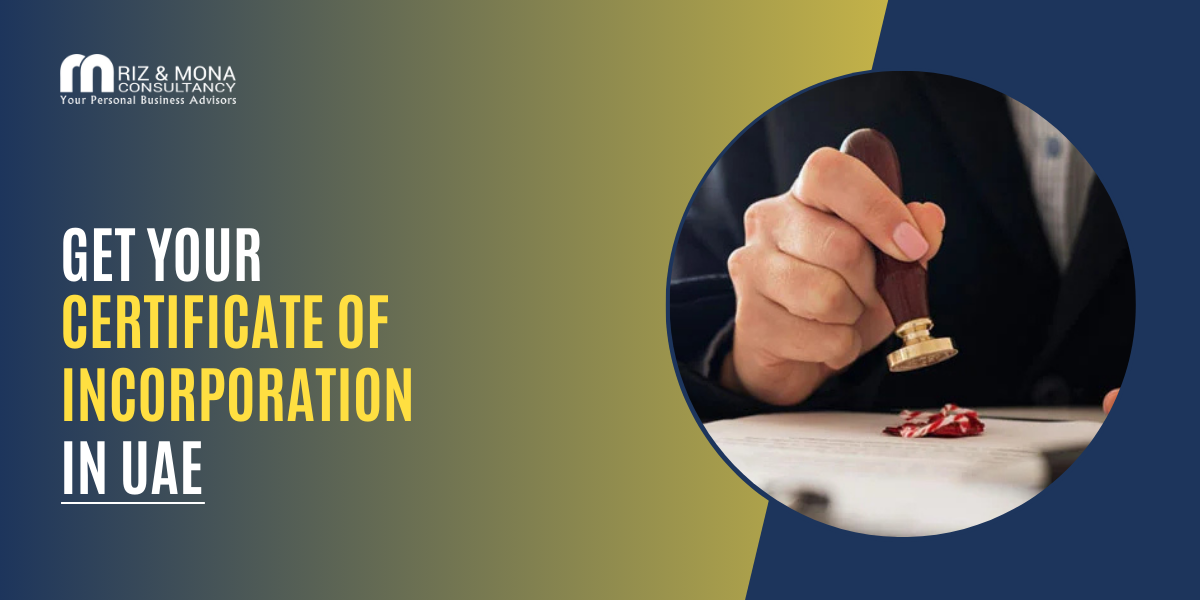How to Apply for a Certificate of Incorporation in the UAE
Choose Your Business Structure and Jurisdiction
-
Business Structure: Decide whether your company will operate as a sole proprietorship, partnership, limited liability company (LLC), or another legal form.
-
Jurisdiction: Determine whether to set up in the Mainland, a Free Zone, or Offshore. Each has distinct regulations and benefits.
Define Your Business Activities
Clearly outline the activities your business will undertake. This ensures compliance with UAE regulations and helps in selecting the appropriate licenses.
Reserve a Trade Name
Choose a unique name that reflects your business identity. Ensure it adheres to the UAE’s naming conventions and is approved by the relevant authority.
Draft the Memorandum of Association and Articles of Association (MOA & AOA)
These documents define your company’s internal governance, including shareholder roles and operational procedures.
Submit the Application and Obtain Initial Approvals
Compile all necessary documents and submit them to the relevant authority (DED for Mainland or respective Free Zone authority). Obtain initial approvals to proceed.
Secure a Trade License
After approvals, apply for the appropriate trade license that permits your business activities.
Receive the Certificate of Incorporation
Upon successful completion of the above steps and payment of fees, you’ll be issued the Certificate of Incorporation, officially recognizing your company as a legal entity in the UAE.
Start Your Business Journey with Our Professional Support!
What Is a Certificate of Incorporation, Its Importance, and Who Issues It in the UAE?
A Certificate of Incorporation UAE is more than just a document, it serves as the official proof of your company’s legal existence. It contains essential details for legal recognition that define your business identity, ownership, and operational scope.
1. Basic Company Details
This section outlines the fundamental aspects of your business:
- Official Business Name & Registration Number – The legally recognized company name and its unique registration ID.
- Date of Incorporation – The exact date your company was legally established.
- Legal Structure – Specifies whether your company is an LLC (Limited Liability Company), Free Zone Establishment (FZE), Free Zone Company (FZC), or Offshore Entity.
2. Ownership and Shareholding
- Shareholders & Directors – Lists the names of all registered business owners, their percentage of ownership, and appointed directors.
- Roles & Responsibilities – Defines the authority of shareholders and directors in company operations.
3. Registered Office
- Official Business Address – The legally registered location of your company as per UAE government records. This is crucial for compliance and official correspondence.
4. Business Activity Scope
- Approved Business Activities – Specifies the type of operations your company is legally permitted to carry out in the UAE, as per its trade license.
A Certificate of Incorporation is an essential document that legally confirms your business is registered and authorized to operate in the UAE. It is required for obtaining trade licenses, securing government approvals, and entering into contracts with clients and suppliers. Without it, a business has no legal standing and cannot function within the country’s regulatory framework.
Banks will not open corporate accounts or approve loans without this certificate. Investors and partners also rely on it to verify a company’s legitimacy. Failure to obtain one can lead to penalties, fines, or even business suspension, making it a non-negotiable legal requirement for any company in the UAE.
A Certificate of Incorporation is not issued by a single central authority in the UAE. Instead, the issuing body depends on where your company is registered, whether on the mainland, in a free zone, or offshore. Below is the breakdown of who provides this certificate based on your business jurisdiction:
1. Mainland Companies – Issued by the Department of Economic Development (DED)
If you register a company in the UAE mainland, your Certificate of Incorporation is issued by the DED of the respective emirate. The DED is responsible for regulating businesses operating within the local economy, ensuring compliance with UAE commercial laws.
- Each emirate has its own DED (Dubai DED, Abu Dhabi DED, etc.), and you must apply through the relevant one.
- Mainland companies require this certificate to engage in business with government entities and operate without restrictions on trade within the UAE.
2. Free Zone Companies – Issued by the Respective Free Zone Authority
For businesses registered in UAE free zones, the Certificate of Incorporation is issued by the specific free zone authority where the company is set up. There are over 40 free zones in the UAE, each with its own regulatory body.
- Some well-known free zones include DMCC (Dubai Multi Commodities Centre), JAFZA (Jebel Ali Free Zone), DIFC (Dubai International Financial Centre), and RAKEZ (Ras Al Khaimah Economic Zone).
- This certificate is required to operate within the free zone, open a corporate bank account, and conduct international transactions.
- Free zone companies have ownership benefits, but they may have trade restrictions outside their designated zone.
3. Offshore Companies – Issued by the Offshore Authority of the Chosen Jurisdiction
If you are setting up an offshore company, the Certificate of Incorporation is issued by the offshore authority of the specific jurisdiction. Offshore companies in the UAE are mainly used for international business activities, asset protection, and tax efficiency rather than local trade.
- Major offshore jurisdictions in the UAE include JAFZA Offshore, RAK ICC (Ras Al Khaimah International Corporate Centre), and Ajman Offshore.
- Offshore companies cannot conduct business within the UAE mainland but can hold assets, own shares in UAE companies, and operate internationally.
- This certificate is essential for opening offshore bank accounts and proving legal existence in global transactions.
What Happens After You Receive the Certificate of Incorporation?
Cost Breakdown: How Much Does It Cost to Get a Certificate of Incorporation in UAE?
The cost of obtaining a Certificate of Incorporation in the UAE varies depending on several factors, including business jurisdiction (Mainland or Free Zone), company type, and required services. While Free Zones may offer lower setup costs, Mainland companies often involve higher fees due to the requirement of a local sponsor and office rental requirements.
- Base Government Fees: Can start as low as AED 6,000 in some Free Zones but may go up to AED 25,000 or more for Mainland companies.
- Additional Costs: Expect to pay for notarization, attestation, office space (if required), and legal consultancy fees, which vary by service provider.
- Ongoing Costs: Some Free Zones have annual renewal fees, and Mainland companies may incur sponsorship or PRO service charges.
Since registration fees fluctuate based on jurisdiction and specific business needs, it’s best to request an official quote from the relevant Free Zone authority or a business setup consultant.
FAQS (Frequently Asked Questions)
Is a certificate of incorporation the same as a trade license?
No, a Certificate of Incorporation confirms legal company formation, while a trade license permits business activities in the UAE.
Does DED issue a certificate of incorporation?
Yes, the Dubai Department of Economic Development (DED) issues it for mainland companies, while free zones and offshore authorities issue theirs separately.
Can I change company details on the Certificate of Incorporation?
Yes, but updates like name changes or shareholder modifications require approvals and amendments through the relevant licensing authority.
Can foreign entities apply for a Certificate of Incorporation in the UAE?
Yes, foreign businesses can incorporate in the UAE through mainland, free zone, or offshore structures, following legal registration procedures.
Do I need to renew a Certificate of Incorporation?
No, the certificate itself doesn’t require renewal, but business licenses and other compliance documents must be renewed periodically.
How long does it take to get a Certificate of Incorporation?
Processing time varies by jurisdiction but typically takes 3 to 10 business days, depending on document approvals and business type.
What happens after receiving a Certificate of Incorporation?
The company can open bank accounts, apply for visas, sign contracts, and legally start operations in line with its approved activities.
What are the consequences of not having a Certificate of Incorporation in the UAE?
Without it, a business cannot legally operate, open a corporate bank account, or obtain necessary permits, leading to fines or suspension.














